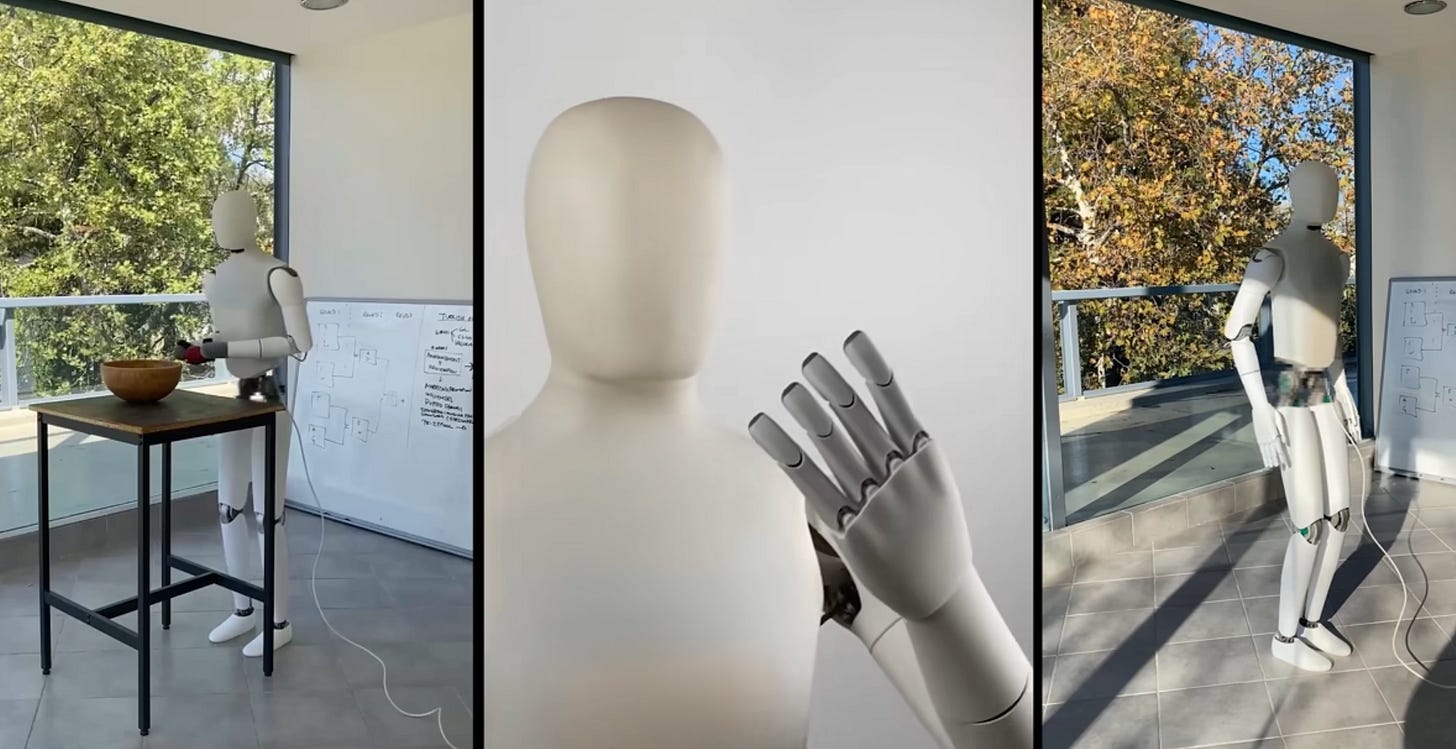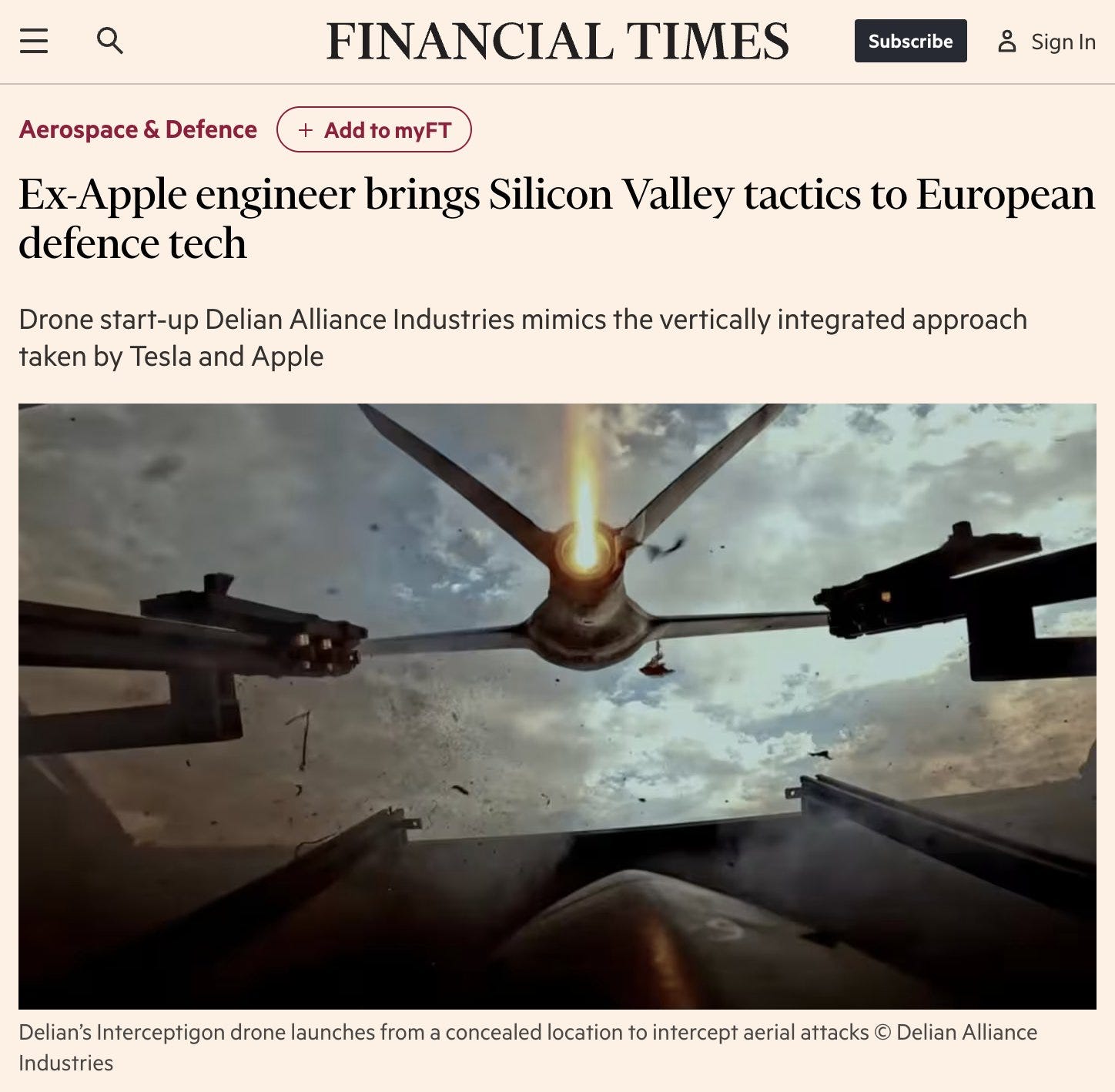Building General Purpose Robots
A 21-year-old building humanoid robots
Startup Pirate, the newsletter for tech & startups made in Greece, is back for Season 6. If you’re not a subscriber, hit the button below and come aboard:
Building General Purpose Robots
Alexandros Petkos built his first robot at the age of 17, a four-legged robot capable of walking and navigating. Now, at 21, a self‑taught engineer, he’s building humanoids. I first met Alex a year ago, when he had assembled a half‑body prototype in his parents’ basement. This time, he logged into our chat from Palo Alto, California, where he recently moved to build his company, Philon.
At the very top of our conversation, there was just the obvious question of how and why. Where did this begin? What catalysed the quest?
“At 14, a high school student in Thessaloniki, I was inspired by the work of Boston Dynamics and OpenAI. I started reading papers on AI and robotics, and coding at night and on weekends. I built a mini quadruped at 15 and a larger version two years later”, he said. (See a version in the video below.)
“The quadruped form factor limits what’s possible in the real world, so I started building a humanoid, re‑using parts and designs. Building a true general‑purpose robot is one of the biggest challenges of our time, and I can’t see myself working on anything else right now”, he continued. Humanoids are all the rage in tech nowadays. Alex is going up against the biggest names: Tesla, Figure, 1X, Unitree.
“I built a prototype in ten months with less than €50k, while well‑capitalised robotics companies took years and spent millions. I think that points to major inefficiencies in their tech stacks and operations,” Alex explained.
He also questions their go‑to‑market. Early last year, Figure announced a partnership with BMW to deploy humanoids in automotive manufacturing. Alex believes this approach won’t scale and won’t produce a true general‑purpose system. “Developing a humanoid for a task that just needs two robotic arms on a mobile base makes little sense. And a robot that picks and places parcels on a factory floor won’t necessarily generalise to cooking in your apartment.”
According to Alex, robotics is still at least half a decade away from its ChatGPT moment, and Philon has a chance to help make this happen. “Google, Apple, and others had chatbots before OpenAI, but OpenAI won years later with a truly general‑purpose chat interface.”
(Below: Philon’s humanoid performing simple manipulation tasks trained on a neural network Alex developed.)
He argues the real moat will be in software, not hardware, and that the next major breakthrough is likely to come from a Western robotics research lab rather than China. I pressed him to name a company whose work he respects. “Physical Intelligence is high on the list”. Physical Intelligence aims to create software that runs on any robot, eliminating the need to develop task‑specific models. Their papers show systems folding laundry, bagging groceries, even removing toast from a toaster. Reports suggest they are in talks to raise at a $5B valuation, following a $400M round last year.
“The industry needs to find ways to accelerate. One key area is more data to train AI to master skills or learn new ones,” Alex explained. While much of the field focuses on teleoperation, controlling robots remotely via joysticks, VR headsets, or mirrored motions, Philon is taking a different track. “We’re putting headsets on humans and recording video while they perform specific activities. It’s cheaper and more scalable”, he added.
Philon has already begun building this dataset, with a globally distributed team capturing residential tasks. The plan is to monetise it before year‑end. Alex didn’t share customer names but says some of the biggest AI companies have expressed interest.
(Below: sample footage of the tasks they’re collecting.)
The market for physical‑world data is heating up. Scale AI, the American data annotation company, made headlines earlier this year when Meta acquired a 49% stake for $14B and “acquihired” founder and CEO Alexandr Wang. A few days ago, Scale announced its Physical AI offering — data collection and annotation to train robotics foundation models — starting with 100,000 production hours.
There’s no Reddit for the physical world; someone has to go out and collect this dataset. In effect, Philon is building a data‑collection business on the way to becoming a general‑purpose robotics company. Alex plans to grow teams in San Francisco and Athens after raising capital from Project Europe, a new early‑stage fund backing founders under 25.
Before we wrapped, I asked Alex how we could get more people his age to take on ambitious projects. “It’s all about agency. Don’t wait for someone to guide or teach you, especially in frontier fields where things evolve daily. Everything you need is online: papers, open‑source projects, you name it,” he said.
Top News
One of Europe’s best‑funded defence startups
This summer, Delian raised a $14 million Series A, which we co‑led with Air Street Capital, to build Europe’s modern defence prime. With $22 million total funding to date, the company is now among the most well‑funded defence startups in Europe and is hiring across the board to execute on an ambitious plan.
From the interview with the founder, Dimitris Kottas, at TechCrunch:
Kottas’ most ambitious bet isn’t on any particular technology — it’s really that a small Greek startup can break through Europe’s notoriously splintered defense market.
A $1 billion push to build superintelligence
In April, I spoke with Ioannis Antonoglou (check our interview here) — an Aristotle University of Thessaloniki graduate, early DeepMind researcher (employee #6), and now co‑founder building AI autonomous systems, starting with coding tools. His company, Reflection AI, is rumoured to be raising $1 billion at roughly a $5.5 billion valuation, reportedly backed by Nvidia, according to the Financial Times. If completed, this would place Reflection among the world’s most well‑funded AI startups.
New MSc in Aerial Autonomous Systems (Aristotle University of Thessaloniki)
Aristotle University has launched the region’s first degree focused on aerial autonomous systems (taught in English). The field carries clear industrial applications and obvious defence relevance. A dedicated programme like this can build a strong talent pipeline in Greece and help develop sovereign capability in a strategic, dual‑use technology.
3D modelling breakthrough hits Hollywood
In 2023, George Kopanas (then a PhD at Inria Sophia Antipolis; formerly University of Thessaly) released 3D Gaussian Splatting, a real‑time rendering technique for photorealistic 3D scenes that marked a breakthrough in 3D modelling. The method recently made headlines for its use in the new Superman film, helping bring Superman’s Kryptonian parents to life.
Join a Startup
These are all roles in early-stage startups which have recently raised their first round of funding and hiring in Greece:
Kubbly (AI customer success): Senior Software Engineer, Senior ML Engineer
Emblematic (AI finance ops): Founding Product Engineer
Inferity AI (AI video analysis): Founding Software Engineer
ComplyStream (financial crime ops): Senior AI Engineer
Some other opportunities you might find interesting:
PolyModels Hub (pharma AI): Senior Frontend Engineer
SMPnet (power grid management): Project Manager
Moving Doors (fully serviced homes): Marketing Manager
VODA.ai (AI water utilities infrastructure): Product Manager
Additionally, you can find more jobs here.
Fundings
Quite a lot has happened since my last post. And yes, venture money is still chasing AI products with traction.
Nothing (smartphones) raised a $200m Series C led by Tiger Global, with plans to launch an AI‑first device. (Those at London Greeks in Tech last winter heard the early version of this story.)
Rillet (AI ERP), one of the hottest B2B SaaS startups right now, raised $70m Series B led by a16z and ICONIQ, 10 weeks after a $25m Series A from Sequoia.
Numan (AI preventive healthcare) raised $60m Series B led by Big Pi Ventures.
Goodpath (AI for chronic conditions) secured $18m Series A led by MassMutual Ventures.
Gradient Labs (AI customer support) raised $13m Series A led by Redpoint.
Dealops (AI revenue operations) secured $7m round led by General Catalyst.
Mind The Hack (cybersecurity) raised €2.8m led by Deep Capital Group.
Emblematic (AI financial ops) attracted $2m led by Passion Capital.
Time-Travelling Milkman (foodtech; plant‑based dairy) raised €2m pre‑Series A led by Evercurious.
Terra Robotics (agricultural robotics) announced a €1.8m led by Uni.Fund.
Panda Surgical (neurosurgical robotics) announced a £1m round led by Oxford Investment Consultants.
Aisthesis Medical (AI‑powered sepsis prediction) raised €1m led by TwinPath Ventures and TECS Capital.
Vivian Lab (femtech) raised €850k led by Eleven Ventures.
Nodes & Link (AI project delivery for construction) secured investment from SE Ventures (backed by Schneider Electric).
M&A
Hack The Box further establishes its leadership in cybersecurity training through the acquisition of LetsDefend, a blue team upskilling platform.
New Funds
Big Pi Ventures launches Big Pi Growth I, the first tech growth equity fund in Greece and Southeast Europe, with €130m first closing (targeting €200m).
TECS Capital launches Fund II with €12m to back deep tech startups.
That’s all for this week. Tap the heart ❤️ below if you liked this piece. It helps me understand which themes you like best and what I should do more.
Find me on LinkedIn or X. Thank you for reading.
Alex




Excellent write-up. Philon is going places!